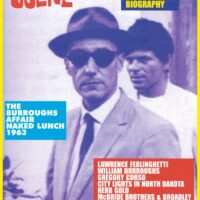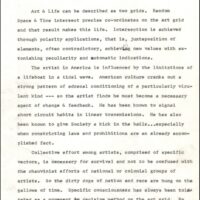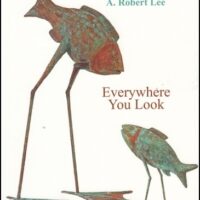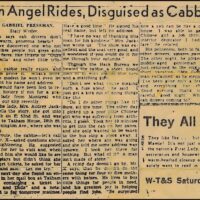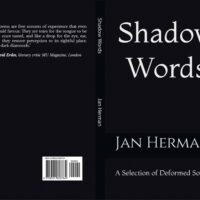UPDATED. The overwhelming number of comics, little magazines, books, posters, and all sorts of poetry and radical literature that Charles Plymell has printed during the last half-century is too many to count. All that time he was writing inspired poetry and prose of his own and having it published by a flock of small presses. Now in old age — he turns 89 today — Plymell is getting significantly renewed attention for his poetry with the release of “Over the Stage of Kansas: New & Selected Poems 1966-2023.” To celebrate the book, he will give a reading on May 18 in Hudson, New York. It’s bound to be a grand occasion.
Archives for April 2024
Over the Stage of Kansas
Willem de Kooning On Escaping the Formulaic
Since today is the 120th anniversary of Willem de Kooning’s birthday, I am reminded by my staff of thousands of his fervent efforts “to break the willed articulation of the image.” Which, as it happens, is not dissimilar to the goal of the cut-up procedure in writing, intended by Brion Gysin and William Burroughs to free the mind and language itself from preconceived formulations. Nor is it a bad follow-up to yesterday’s blogpost about “Cut Up or Shut Up.”
Beat Scene
All About Cut Up or Shut Up (and Weissner, Ploog & Me)
Kevin Ring, the indefatigable editor of Beat Scene magazine, emailed me a few months ago to ask about the new reprint of “Cut Up or Shut Up” released by the German publisher Mokolo Print in a facsimile edition in English with a new cover design by Robert Schalinski and a modest intro by yours truly. Ever curious about all things Beat, Ring wanted to know the back story of the book’s origin and development. Et voilà!
Influenced by Limitations of a Lifeboat in a Tidal Wave
Before I needed to earn a living from writing, I was a member of the avant-garde — fervent and full of high opinion. The other day I came across a typescript of “Synchronic Non-Causative Agent,” an unpublished paper of mine written more than half a century ago. Reading it over, I got the bright idea of posting it here despite its age.
A Marathon Reading
Gertrude Stein’s The Making of Americans
My staff of thousands thinks of it as the “Moby-Dick” of modernism.
Something to Surprise You: Everywhere You Look
A. Robert Lee is such a prolific author in both his creative and academic books that I won’t try to characterize his writings other than to say they invariably illuminate life and literature with a wealth of scholarship, intelligence, and linguistic mastery. I will add, however, that his sense of humor is one aspect of his writings that I most treasure.
Genesis of a Poem
All That Would Ever After Not Be Said
In 1952, when the late Gabe Pressman (dean of New York City’s local TV press corps) was a young staff writer at the New York World-Telegram & The Sun, he came across a story tipped to him by a woman from Montreal who’d taken a cab ride in midtown Manhattan. This was the human-interest feature he wrote up. And this is the poem it generated many decades later.
Term It Op Art or Visual Poem
This Is a War Protest in Red and Black
Created by Polish artist Barbara Galinska.
Shadow Words
London Literary Critic Calls Them ‘Dark Diamonds’
‘These poems are free sonnets of experience that even Blake would favor. They are tears for the tongue to be savoured once tasted, and like a drop for the eye, ear, or mind, they restore perception to its rightful place. They are dark diamonds.’ — David Erdos, MÜ Magazine, London

![Charles Plymell [photo by Gerard Malanga]](https://www.artsjournal.com/herman/wp/wp-content/uploads/2015/07/Charles-Plymell-photo-by-Gerard-Malanga-e1437239454525.jpg)

